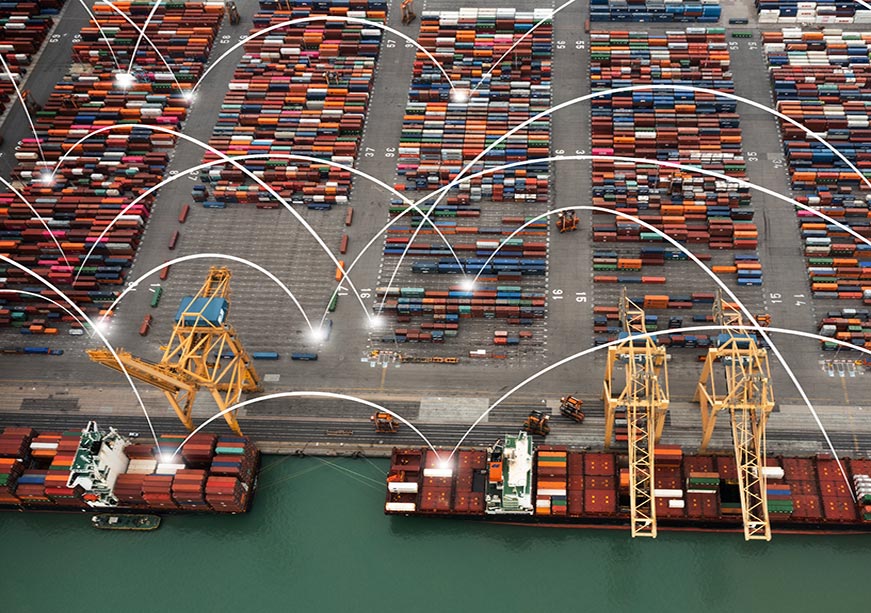-
CENTRES
Progammes & Centres
Location
By enhancing maritime connectivity through infrastructure and energy collaborations, Greece and India are creating vital links between the Mediterranean and Indian Ocean

Image Source: Getty
This article is part of the essay series “Sagarmanthan Edit 2024”
The Mediterranean Sea has long served as a bridge of commerce and culture, linking civilisations and laying the groundwork for a rich legacy of connectivity. Ancient Greece and India fostered some of the earliest maritime trade exchanges, establishing a pattern of cooperation that today finds renewed relevance. The recent upgrade in Greece and India’s relationship to a Strategic Partnership, solidified during Indian Prime Minister Narendra Modi’s 2023 visit to Greece and the Greek Prime Minister Kyriakos Mitsotakis’ visit to India in 2024, reinforces this shared vision of strengthening ties between the Mediterranean and the Indian Ocean.
The pandemic highlighted vulnerabilities within global supply chains, which relied on singular trade routes and the efficiency of just-in-time shipping models.
As global trade, and economic and geopolitical dynamics evolve, both Greece and India recognise the importance of diversified trade corridors that are resilient to economic disruption. The pandemic highlighted vulnerabilities within global supply chains, which relied on singular trade routes and the efficiency of just-in-time shipping models. Unlike other sectors, maritime shipping proved indispensable, ensuring the continuity of vital supplies. India's G20 agenda in 2023, themed “Vasudhaiva Kutumbakam: One Earth, One Family, One Future,” reflects an emphasis on sustainable connectivity — a shared vision that resonates with Greece's strategic objectives.
The renewed emphasis on multi-modal corridors between the Mediterranean and Indian Ocean regions reflects a transformative approach to regional connectivity. These corridors, connecting key points across Asia, the Middle East, and Europe, aim to establish more resilient economic pathways that integrate the Mediterranean economies with global networks. With strategic Mediterranean ports, such as Greece’s Piraeus, the region positions itself as an ideal entry point to the European Union (EU) market, enabling economic diversification and fostering sustainable growth, especially through the India-Middle East-Europe Economic Corridor (IMEC).
Piraeus Port's geographic advantage at the crossroads of three continents underscores its significance as a primary node for intercontinental trade.
Piraeus Port's geographic advantage at the crossroads of three continents underscores its significance as a primary node for intercontinental trade. Greece and India’s mutual goal of doubling bilateral trade to US$ 4 billion by 2030 reflects this potential. This partnership strengthens Greece’s role within the EU, supporting efforts to facilitate smoother trade with the Indian Ocean economies.
The Greece-India partnership champions a vision for sustainable economic cooperation, rooted in the principles of the blue economy, which advocates for the responsible use of marine resources. For Greece, this collaboration offers an opportunity to revitalise its shipbuilding sector. According to recent data from the United Nations Conference on Trade and Development (UNCTAD), demand for eco-friendly ships is expected to rise in the coming years, creating opportunities for Greek shipyards to focus on retrofitting and building vessels designed for green transport.
Likewise, India’s expertise in renewable energy provides viable pathways for Mediterranean countries aiming to reduce carbon emissions. Through India’s “One Sun, One World, One Grid” (OSOWOG) initiative, a shared green energy grid could enable regional collaboration and build resilience in energy production and consumption, aligning well with Greece’s renewable energy objectives.
At the 2024 Confederation of Indian Industry (CII) India Mediterranean Business Conclave, Indian officials highlighted India’s rapid pace of infrastructure development as a model for the Mediterranean, particularly in connectivity projects. The potential for cross-border infrastructure collaboration extends to port development, a critical aspect for Mediterranean countries seeking to enhance trade networks and expand maritime capabilities.
The potential for cross-border infrastructure collaboration extends to port development, a critical aspect for Mediterranean countries seeking to enhance trade networks and expand maritime capabilities.
A notable step in this direction is the recent bilateral memorandum of understanding (MoU) signed to facilitate joint technology projects and promote investment in high-tech sectors. Enhanced trade relations with India serve as a test phase for the proposed Free Trade Agreement (FTA) between India and the EU, which promises to unlock even more substantial market potential and support the modernisation of trade standards between these two major markets.
The strengthening of maritime connectivity between the Mediterranean and the Indian Ocean is embodied in initiatives like the IMEC, fostering cooperation between Europe, the Gulf states, and India. This corridor reflects a shared ambition for economic diversification amidst a rapidly changing global order marked by multipolarity. With IMEC partner countries representing over half of the global GDP and approximately 40 percent of the world’s population, IMEC holds significant geopolitical promise. While the corridor is poised to enhance infrastructure and trade, its primary value may lie in fostering strategic connectivity and solidarity among participants amid global volatility.
The development of such multi-modal corridors promotes regional integration and fosters economic resilience. This emerging network represents an alternative to existing trade routes, strengthening both the Mediterranean and Indian economies and reinforcing their positions globally. India’s trade with the Mediterranean has already grown substantially, reaching US$ 77.89 billion in 2023—a robust foundation for future collaboration.
Mediterranean countries and India should remain committed to fostering inclusive maritime governance through various dialogues and collaborative forums. By advocating for the sustainable use of marine resources and responsible maritime practices, we can address pressing challenges in marine protection and ecological preservation. Initiatives like the Sagarmanthan Dialogue enable robust discussions on sustainable maritime practices, with a collective goal of reducing illegal, unreported, and unregulated (IUU) fishing, which currently accounts for an estimated 20 percent of global catches. This partnership aligns with the UN Sustainable Development Goal (SDG) 14, which calls for the sustainable management of oceans and marine resources. Such collaborative efforts position our regions as leaders in advocating for responsible maritime practices in an increasingly interconnected global economy.
Initiatives like the Sagarmanthan Dialogue enable robust discussions on sustainable maritime practices, with a collective goal of reducing illegal, unreported, and unregulated (IUU) fishing, which currently accounts for an estimated 20 percent of global catches.
The Greece-India partnership stands as a model of how historical connections can evolve into a forward-looking framework for economic growth and resilient development. By enhancing maritime connectivity through infrastructure initiatives, energy collaboration, and sustainable practices, Greece and India are creating vital links between the Mediterranean and the Indian Ocean. This evolving maritime corridor has the potential to stimulate economic activity, reduce negative environmental impact, and advance shared values of responsible development and governance.
In building these “blue bridges,” Greece and India celebrate their rich legacy while positioning themselves as key players in the global maritime economy. Through strategic connectivity, this partnership not only strengthens trade but also promotes regional stability and resilience, underscoring the vital role of the Mediterranean-Indian Ocean corridor in changing global dynamics.
Konstantinos Foutzopoulos is a Senior Program Officer of the Circle, the Mediterranean Forum.
The views expressed above belong to the author(s). ORF research and analyses now available on Telegram! Click here to access our curated content — blogs, longforms and interviews.

Konstantinos is Senior Program Officer of the Circle the Med Forum, the par excellence environmental diplomacy forum in the Mediterranean, promoting Blue Economy, innovative maritime ...
Read More +